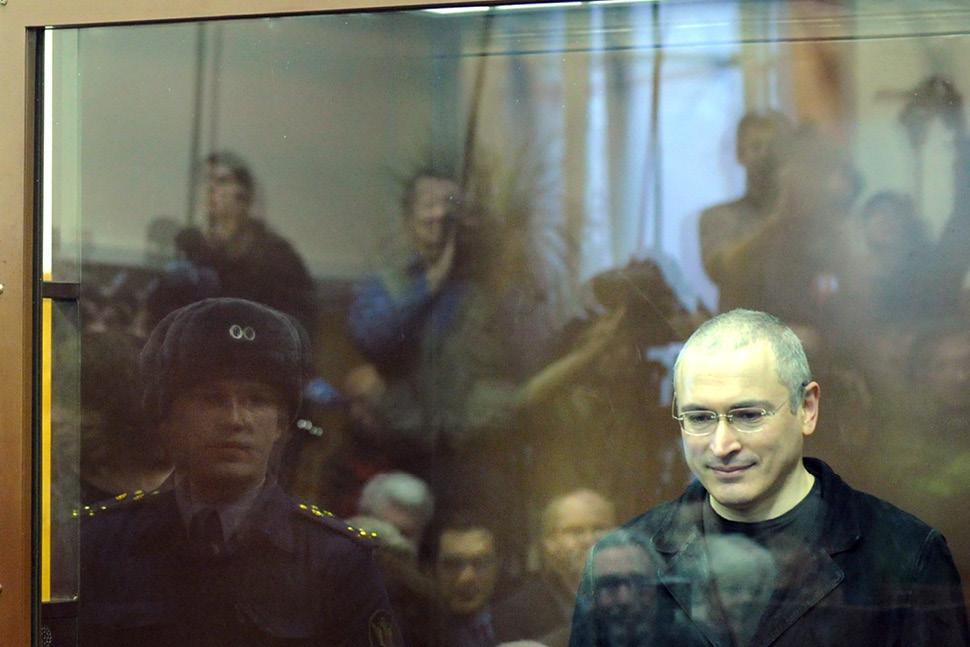Review: Citizen K (2019), by Alex Gibney

Alex Gibney is one of the world’s most prolific documentarians with an average of two titles in different formats (film, TV series), styles and genres every year as a director only. He is even more active as a producer. His is a man of reputation partly due to his high releasing tempo and partly because of his great recent films like Mea Maxima Culpa: Silence in the House of God (2012) and Going Clear: Scientology & the Prison of Belief (2015). Apart from being quite big, Gibney’s opus is also diverse, some of his work is lighter, some is more socially engaged and engaging, but one thing is certain: he has never dropped a ball until Citizen K, the documentary that has just premiered in the official selection of the Venice film festival, out of competition.
Again, the topic is relevant and the subject, the fallen Russian oligarch Mikhail Khodorkovsky, is quite an interesting one. The first half of the film is quite informative regarding Khodorkovsky’s past during the three Russian regimes – from the Soviet times he grew up in as a son of poor industry white collar workers, up to his clash with Vladimir Putin and his clique. There are things to be learned about the Russian privatization from which Khodorovsky as a smart man with little scruples benefited greatly, especially about voucher wheeling and dealing in the early stages and loans for shares scheme that helped Yeltsin win the tightest elections in the history of Russia in 1996. Khodorovsky, his business partners and other key figures from that time also explain the interaction between the capitalism and democracy as a concept, and Russia as a country and nation, as well as how the latter was never ready for the former.
But all goes downhill once Vladimir Putin is introduced as a political leader and as the film antagonist, for Khodorkovsky personally and for the film itself. Other than linking the current long-standing Russian president to both of the previous regimes, as he was climbing the ranks in the later Yeltsin times, but kept his KGB connections from the Soviet times, Citizen K does little to show the mechanisms of animosity between the two strong “players” and men.
Khodorkovsky’s story is not exactly a sad one: he was convicted on fraud charges in a somewhat political process, did his time in the Siberian prison and emigrated to London from where he supports the different figures from the ranks of Russian opposition. Also, he is very much alive and present in the film to interfere with it and to use it as some sort of global media time to present himself in the best light possible.
It seems that Gibney has fallen under Khodorkovsky’s spell, with the occasional attempts to distance himself from his subject to little success. And that is one of the film’s principal problems: it seems a bit hagiographic since the lasting impression is that the former oil tycoon responsible for a myriad of shady deals mainly does the talking, while the others among the interviewees merely support his story. And, as the time passes by, all of the involved, Gibney included, tend to get quite repetitive. A half an hour trim to the over two hours run-time would be beneficial.
Style and direction-wise, Citizen K is polished enough and easy to follow. It is mainly based on “talking heads” interviews, but that type of material (the most boring one usually) switches to archival footage from different sources (usually the media) in a dynamic fashion and there are even some impressive drone shots accompanied by a loud neo-classical soundtrack for the monumental effect. With its slick style and the political topic that can be considered hot enough, the film seems like a safe bet for the autumn festival circuit before landing on TV.
The trouble is, Alex Gibney is not sure how much of his own “first person” presence he wants in the film, and how much of his own stance he is allowed to have (or if he is informed enough to have one at first place), so Citizen K could be easily written off as a piece of foreign political propaganda. Simply put, it seems quite redundant, especially compared to the documentaries actually coming from Russia and the authors like Vitaly Mansky, specifically his Putin’s Witnesses (2018).
Countries: UK, USA
Language: Russian, English
Runtime: 128 min.
Director: Alex Gibney
Production companies: Passion Pictures, Storyteller Productions, Jigsaw Productions
Screenplay: Alex Gibney
Cinematographers: Mark Garret, Dennis Sinyakov
Editor: Michael J. Palmer
Sound Recordist: Vasily Amochkin
Sound Effects Editor: Tom Foster
Re-recording Mixer: George Foulgham
Sound Recordist: Stephen Hopkins
Composers: Robert Logan, Ivor Guest
Camera Operator: Kelvin Richard
With: Mikhail Khodorkovsky, Vladimir Putin, Leonid Nevzlin, Boris Berezovsky, Igor Malashenko, Boris Yeltsin
















